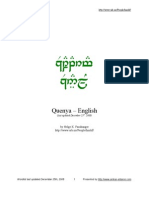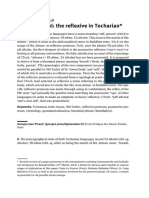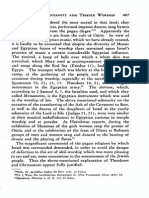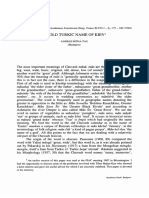Harper Songs
Harper Songs
Uploaded by
Iwenmutef Sa AsetCopyright:
Available Formats
Harper Songs
Harper Songs
Uploaded by
Iwenmutef Sa AsetCopyright
Available Formats
Share this document
Did you find this document useful?
Is this content inappropriate?
Copyright:
Available Formats
Harper Songs
Harper Songs
Uploaded by
Iwenmutef Sa AsetCopyright:
Available Formats
21 Two Harpers Songs
Don't ask, Leuconoe! What business have you and/or I to know When death comes from the gods? Neither consult soothsayers and the like! So much better to take whatever comes, whether this winter is One of many that Jove's given us, or whether we're seeing for One more time how the sea batters the cliffs, how they are tumbling down. Let's be wise above all, get out the wine, and never make big plans! Let small hopes be enough! While we two speak, time, reckless time, flies by. So seize this very day, and never count on what the future holds. Horace Ode 1.11, translated by Walter Baumann
Stela of Nebankh
Hsw TniaA Dd.f
mntwi tw m st.k nt nHH m miHat.k nt Dd
iw smH.ti Xr Htpt DfAw arf.n.s bw-nb nfr
kA.k Hna.k n(n) znt.f ir.k
xtmt(i)-biti imi-r pr wr aA nbanx iw n.k TAw nDm n mHyt
in Hsw.f sanx rn.f imAxy Hsw TniaA mr.n.f Hs n kA.f ra nb
Song from the Tomb of King Intef1
Hsw nti m Hwt IN&F mAa xrw
nti m bAH pA Hsw m bnt
wAD pw sri pn nfr SAw nfr HDy
Xt Hr zbt kt Hr mn Dr rk imiw HAt
nTrw xprw Xr-HAt Htp.w(i) m mrw.sn
saHw Axw m mitt qrs.w(i) m mrw.sn
qd(w) Hwt nn wn swt.sn ptr irw m.sn
iw sDm.n.i ii-m-Htp Hna Hrw-dd-f
sDd.ti m sDdwt.sn rsi
ptr swt iri inbw.sn fx(.wi)
nn wn swt.sn mi nti(w) nn xpr.sn
Numbering and typesetting follows Hoch, Exercise XVI(B) pp. 232-233.
bw iy im sDd.f qdw.sn sDd.f xrt.sn sm.f ib.n
r Hnt.n r bw Smw.sn im
wDA.k ib.k r.s mh ib Hr.s Ax n.k/mht-ib Hr sAx n.k Sms ib.k wnn.k
imi antiw Hr tp.k wnx n.k m pAkt
ms.ti m biAw mAa n Hwt nTr
imi HAw Hr nfrw.k m bAgy(w) ib.k
Sms ib.k Hna nfrw.k ir xwt.k tp tA m HD ib.k
iw n.k hrw pfA n sbHwt
bw sDm.n wrd-ib sbHwt.sn
bw Sd nAy.sn iAkbw ib z(i) im m H(A)t
mAwt ir hrw nfr
m wrdw n.i im.f
m.k nn rdi n z(i) itt xwt.f Hna.f
Emended following Hoch, p. 234.
m.k nn wn Sm iw anw
Two Harpers Songs
Vocabulary
Hsi sing Hsw singer maHat miHat tomb Htpt offerings DfAw provisions zni pass (by), surpass, transgress xtmt(i)-biti treasurer/seal bearer of the king of Lower Egypt mHyt northwind imAxy honored Hsw song bnt harp , sri official SAw fate Hdi destroy, injure, disobey (heart) HDy destruction , Xt generation zbi pass on, send rk time, era imiw HAt ancestors, lit. those who are in before mr pyramid saH noble, dignitary Axi akh clothed pAqt fine linen ms anoint HAw excess, more nfrw beauty, perfection, happiness bAgi weary, lazy sbH cry, wail quite inb wall fx destroy, fall to ruins Hn rush, hurry quotation rsi, rssi entirely, , ptr who, what sDdwt literary works, , qrs bury qd build
qdw form, state, manner, character xrt condition . sm help, relieve mhi forgetful, neglectful sAx spiritualize (deceased), glorify (god), beautify (tomb) antiw myrrh wnx put on (dress), be
sbHwt (noun) cries, wailing wrd (verb) weary, tire iAkb mourning, plural wailings
HAt tomb mAwt new thing anw again
Two Harpers Songs
Grammar Points
"Why, O Gish, does thou run about? The life that thou seekest, thou wilt not find. When the gods created mankind, Death they imposed on mankind; Life they kept in their power. Thou, O Gish, fill thy belly, Day and night do thou rejoice, Daily make a rejoicing! Day and night a renewal of jollification! Let thy clothes be clean, Wash thy head and pour water over thee! Care for the little one who takes hold of thy hand! Let the wife rejoice in thy bosom!" Gilgamesh (Babylonian version), translated by Albert T. Clay
Stela of Nebankh
Hsw TniaA Dd.f
mntwi tw m st.k nt nHH m miHat.k nt Dd A noun + circumstantial sDm.f /subject-imperfective construction introduces Tjeniaa, the singer of this song. The song itself starts with an exclamatory adjectival sentence. The subject, the deceased is addressed in the form of the dependent pronoun tw. an alternative spelling of tomb can be elevated to monument. maHat or is
miHat and its meaning
iw.s mH.ti Xr Htpt DfAw arf.n.s bw-nb nfr
kA.k Hna.k n(n) znt.f ir.k The abundance of offerings in the tomb is described with a subject-stative construction using the transitive verb mH fill having therefore passive meaning. (The suffix pronoun .s refers to miHat, a feminine noun.) The preposition Xr under followed by mH should be translated as of or with. The circumstantial sDm.n.f /perfect of the verb arf contain, enclose, include denoting completed action further emphasizes that the tomb has everything that the deceased needs. A further comfort to him, the presence of his spiritual element kA, is emphasized in a short adverbial clause. In the last clause, the negated infinitive, qualifying the previous statement, starts with the negative particle indicated only by . (Note that the context shows that the last clause is not
a negated sDmt.f construction which would mean before/not yet heard.) Another example for the negated infinitive with suffixed subject is pr.k aq.k nn HnHn.k nn Sna.k Hr sbA n dwAt1.
xtmt(i)-biti imi-r pr wr aA nbanx iw n.k TAw nDm n mHyt
in Hsw.f sanx rn.f imAxy Hsw TniaA mr.n.f Hs n kA.f ranb A well-wish from the singer to the deceased whose name nbanx and titles are listed here is given in an adverbial clause with simple grammar. The next clause starts with a participial statement the beginning of which can be translated as: It is his singer. This is followed by the active participle of the causative verb sanx make live, nourish, keep alive asserting the singers duty. The relationship of respect
[Urk. IV 498, 7-9].
between the singer and the deceased is given by the adjective
imAxy honored (a
phrase usually applied to two individuals) and that of affection by the perfect relative form mr.n.f whom he loved of the verb mri love. Finally, the active participle of Hsi sing specifies how the name of the deceased will be kept alive, once again, a reminder and assertion of the singers duty.
Song from the Tomb of King Intef2
Hsw nti m Hwt IN&F mAa xrw
nti m bAH pA Hsw m bnt A common feature of Late Egyptian is the appearance of out-of-the-place weak consonants w and y, superfluous ts and seated man determinatives. This passage is no exception. The simple grammar here has the subject Hsw song modified by two typical relative clauses with adverbial predicates. funerary chapel. The evil bird Hwt enclosure should be promoted to
determinative (for the feminine bint evil, badness) for harp.
is (probably) a scribal error and should be replaced with
wAD pw sri pn nfr SAw nfr HDy This passage has been interpreted in different ways. Federn3 splits the passage into three parts: wAD pw sri pn | nfr Saw | nfr HDy; interprets the first as an A pw B nominal sentence B is A and the last two as adjectival sentences with the same predicate nfr: A happy one is this prince; good is the destiny; good is the injury. Lichtheim4 splits the passage into two parts wAD pw sri pn nfr | SAw nfr HDy; interprets the first nfr as modifying sri pn and the second as an AB nominal sentence: He is happy, this good prince! Death is a kindly fate. But the use of AB nominal sentences with both A and B nouns or noun
2 3
The analysis here extends the grammar notes of Hoch, p. 234. JNES 5(1946) p. 259. 4 M. Lichtheim (I), p. 197.
phrases is restricted. Wilson5 agrees with Lichtheim in the division, but interprets the second part as a sentence with verbal predicate, the prospective/subjunctive sDm.f of the (intransitive) 3ae-inf. verb HDi:6 Prosperous is he, this good prince; Even though good fortune may suffer harm. One generation passeth away, And another generation cometh; But the earth abideth forever. Ecclesiastes 1:4 The Bible (King James Version)
Xt Hr zbt kt Hr mn Dr rk imiw HAt The alternative spelling of Xt generation shows that it is a collective
noun. kt (an)other refers to Xt and that is why it received the plural strokes. The passing of generations after generations is expressed by two pseudoverbal Hr + infinitive constructions. The presence of the determinative is due to its phonetic value smn. imiw HAt
The determinative is suggestive to the meaning of the phrase HAt by replacing m with the plural prepositional nisbe imiw.
ancestors, lit. those who are in before. It is derived from the compound preposition m
nTrw xprw Xr-HAt Htp.w(i) m mrw.sn
saHw Axw m mitt qrs.w(i) m mrw.sn
qd(w) Hwt nn wn swt.sn ptr irw m.sn The first two clauses contain subject-stative constructions with (the transitive use of) the verb
5 6
Htp rest (in tomb) and the (transitive) verb
qrs bury and
ANET, p. 467. In this verb class the prospective/subjunctive can receive an y ending.
they have passive meaning. Note the plural of the perfective active participle of the verb xpr happen, evolve. is a Late Egyptian spelling of Xr under, and suggests that Axw
the compound preposition Xr-HAt means before. The determinative
should be viewed as a (plural) noun (and not the adjective blessed whose determinative is ) so that the noun in question refers to the akhs, the spiritual entities of the
Egyptian society, those who lived and made successful transition to afterlife. The compound preposition m mitt likewise can be translated as too or also. The tone suddenly changes and the song turns the attention to the tomb builders expressed by the plural perfective active participle of the verb , qd build. As
noted in the analysis of the Poetical Stela of Thutmose III, nn wn with the indicative /perfective sDm.f of wn expresses negation of existence there is not, there does not exists. The interrogative pronoun pronoun pw and the particle ptr who, what (a contraction of the demonstrative tr) followed by the plural perfective passive
participle ir(y)w of iri make, do questions the fate of these dedicated workers. Since iri + m is an Egyptian idiom of become of, happen to, the whole clause can be translated as what became/has become of them?
iw sDm.n.i ii-m-Htp Hna Hrw-dd-f
sDd.ti m sDdwt.sn rsi In the first main clause, using the circumstantial sDm.n.f /perfect of sDm hear, listen, the singer claims familiarity with the words of the famous Old Kingdom sages Imhotep, the vizier of Djoser, and Hardededef, Khufus son. In the second clause the stative has no preceding subject. The transitive caus. 2-lit.verb sDd recite, retell, relate (+ m of) receives the 3FS stative suffix .ti and carries passive meaning recited. The object is sDdwt is more likely literary works than quotations as the adverb rsi entirely emphasizes.
We all envy the immortals because they are free, But fame and fortune we cannot forget. Where are the ministers and the generals of the past and the present? Under neglected graves overgrown with weeds. Tsao Hsueh-Chin, Dream of the Red Chamber translated by Chi-Chen Wang
ptr swt iri inbw.sn fx.wi
nn wn swt.sn mi nti(w) nn xpr.sn This passage now begins to question the fate of the places of these sages who are referred to only by the nisbe iri, lit. pertaining to. The response comes immediately first in a subject-stative construction describing the state of the walls with the stative of the transitive verb fx destroy. In the last two negative clauses, the second introduced by the prepositional phrase mi ntiw, lit. like ones which (in which the relative adjective nti is used as a noun) puts even more emphasis to the first. Finally, the negated indicative /perfective sDm.f of the verb xpr the suffix pronoun .sn refers back to the places and the clause be translated using the word never. (Note that in Late Egyptian are often interchanged.) and
bw iy im sDd.f qdw.sn sDd.f xrt.sn sm.f ib.n
r Hnt.n r bw Smw.sn im In Late Egyptian negation is often expressed by the negative word n(i) and bn in place of bw in place of
nn. Here we actually see a double interchange as the
negation of the perfective active participle iy of the verb ii return requires a negated
existence using nn. The adverb im from there refers the realm of the dead. The three adverb clauses that follow detail the (possible) purpose of return. The verbs are sDd relate, tell and sm help, relieve written wrongly as and emended as .
(Hoch7 remarks that the scribe may have mistakenly believed that the line was the passive construction sm.tw ib.n.) All the verb forms are in prospective/subjunctive sDm.f and can be translated by inserting first (so) that. Alternatively, Lichtheim bypasses the expressed subjects and uses infinitives. The r + sDmt.f construction until he has/had heard applied to the verb Hn rush, hurry (and suffix pronominal subject n we) has an ironic tone. Finally, the verb form of Smi walk, go (with speed contrasting with Hn) is a (plural) perfective relative form. (Note the space-filler t above the walking leg determinative.) The antecedent of this clause is bw and the coreferent is not expressed as it is the object of the preposition m.
wDA.k ib.k r.s mh ib Hr.s Ax n.k/mht-ib Hr sAx n.k Sms ib.k wnn.k This passage starts with the prospective/subjunctive sDm.f wDA ib.k
rejoice, take heart. The feminine suffix pronoun .s is a general reference to the previous skepticism. The next clause can be interpreted in two ways. If in the t
above the evil bird is disregarded then this verb form is imperative with a Late Egyptian group-writing of mhi forgetful, neglectful. Then mh ib Hr.s is a complete
clause in which the general reference to the skepticism continues with the suffix pronoun .s. The next short clause Ax n.k is then an adjectival sentence with a sarcastic tone. On the other hand, if the t is considered essential then mht ib becomes a phrase for forgetfulness, negligence. The syntactically adverbial sentence mHt-ib Hr sAx n.k with the infinitive of sAx applied to a deceased as spiritualize, to a god as
glorify, and to a tomb as beautify can be interpreted as advantageous.
Op. cit.
The imperative returns for the verb Smsi follow with a clear meaning. The last short adverb clause (which can be introduced by while) contains the circumstantial /imperfective sDm.f of wnn exist, be.
imi antiw Hr tp.k wnx n.k m pAkt
ms.ti m biAw mAa n Hwt nTr The imperative continues this time with more specific suggestions. In the first two clauses the imperatives of the verb rdi put and wnx put on (dress), dress are employed while in the third the imperative (as a command) is expressed by the stative with the second person suffix pronoun .ti. Note that the noun biAw can also be used for luxury items, and the phrase Hwt nTr lit. gods things can be translated as fit for a god. Wherefore I perceive that there is nothing better, Than that a man should rejoice in his own works; For that is his portion: for who shall bring him to see what shall be after him? Ecclesiastes 3:22 The Bible (King James Version)
imi HAw Hr nfrw.k m bAgy(w) ib.k
Sms ib.k Hna nfrw.k ir xwt.k tp tA m HD ib.k The imperatives continue first using the phrase rdi HAw increase, heap/pile up lit. make excess/more and then with the negative imperative as m do not (abbreviated here
) followed by the negatival complement of the adjective-verb
bAgi weary, lazy. This is an example of a 4ae-inf. verb which, in addition to the negatival complement ending w, also receives an additional y. In the usual spelling of the
complement pintail duck pA.
the scribe replaced the bA-bird with the flying
The decorative spelling Egyptian feature.
of the imperative Sms of the 4ae-inf. verb Smsi is a Late
iw n.k hrw pfA n sbHwt
bw sDm.n wrd-ib sbHwt.sn
bw Sd nAy.sn iAkbw ib z(i) im m H(A)t The initial adverb clause: (when) the day of signals emphatic construction, so that the verb form of iw is a (nonattributive) relative form. The subject is the indirect genitive hrw n sbHwt in which the late form of demonstrative pronoun nfA (with the compounded determinative ) is moved forward. The next clause starts with the negated
circumstantial sDm.n.f /perfect of the verb sDm expressing negation of action or inability. As discussed previously, the Late Egyptian negative word bw stands for n(i).
The subject is the nfr Hr construction wrd-ib weary of heart. In general, it means someone with inert heart or slow heart beat, and here the god determinative clearly points to the dead Osiris. The negated prospective/subjunctive sDm.f of the verb Sdi rescue, save with place of nn should be interpreted as negated future. The late form of the bw in
demonstrative pronoun nAy is used in the subject nAy.sn biakw. The object is the direct genitive ib z(i) and the vague adverb im from it is made precise in the attached prepositional phrase m HAt.
mAwt
ir hrw nfr
m wrdw n.i im.f
m.k nn rdi n z(i) itt xwt.f Hna.f
m.k nn wn Sm iw anw The noun mAwt means refrain, lit. a new thing, and the out-of-place determinative is possibly influenced by the spelling of mAwt shaft.
Imperative of iri governs the special phrase make holiday which has a dual reference: one for everyday life and another for death and afterlife. In addition, ancient Egyptians also employed this term for funerary festivities held on special days in the cemeteries. Using the negative imperative m and the negatival complement wrdw (of the verb wrd), the singer (present only by the suffix pronoun .i) makes a last effort to cheer up the listeners. Calling for their attention with the particle m.k, he once more reminds his audience to enjoy life for two principal reasons given in the last two clauses. (The second particle should read m.k not m.k wi.) Grammatically, the first uses negated passive (nn in place of n(i)) of the verb rdi expressing negation of action/ability (it) is not allowed/permitted, lit. (it) is not given. Second, the negated indicative/perfective sDm.f construction nn wn of the verb wnn, lit. there is not is followed by the perfective active participles of the verbs Smi go and iwi return.
Bibliography
Text: Cairo Museum; Ramesside Papyrus Harris 500 British Museum 10060; Cemeteries of Abydos, II, pl. xxiii, 5; W. Budge, Facsimiles, pls. xlv-xlvi, pp 23-24; Hoch, Leiden
Museum; 232-234; Holwerda-Boeser, Beschreibung, Vol. IV, pl. 6; M. Lichtheim, The songs of the harpers, JNES 4 (1945) 178-212; pls. 1-7; Mller, Liebespoesie, pls. xii-xvi pp. 29-30; Sethe, 87. Commentaries/Grammar: Budge, op. cit.; Michael V. Fox, The entertainment song genre in Egyptian Literature, Egyptological Studies,: Scripta Hierosolymitana 28 (1982 268-316; Lichtheim, op. cit.; Lichtheim, 193-197; Mller, op. cit. Translations: J. H. Breasted, The Dawn of Conscience, New York (1933) 163-164; F. Daumas, La civilisation de lEgypte pharaonique, Paris, 1965 404-405; Erman, 133-134; M. Lichtheim, 194-197; J. A. Wilson, ANET, 467-468; Simpson, pp. 332-333.
You might also like
- Roland Enmarch - The Reception of A Middle Egyptian Poem: The Dialogue of Ipuwer and The Lord of All in The Ramesside Period and BeyondDocument8 pagesRoland Enmarch - The Reception of A Middle Egyptian Poem: The Dialogue of Ipuwer and The Lord of All in The Ramesside Period and Beyond☥ The Drop Squad Public Library ☥100% (1)
- Keil and Delitzsch Commentary On The Song of SongsDocument169 pagesKeil and Delitzsch Commentary On The Song of Songspsebooks100% (1)
- On The Being and Conception of Physis in Aristotle's Physics SS 1 PDFDocument52 pagesOn The Being and Conception of Physis in Aristotle's Physics SS 1 PDFnukiduzNo ratings yet
- Exegesis of Psalm 8Document19 pagesExegesis of Psalm 8bruddalarry90% (10)
- Pusan and SarasvatiDocument176 pagesPusan and SarasvatiSiarhej SankoNo ratings yet
- Róna-Tas - Berta: Turkic Loanwords in HungarianDocument86 pagesRóna-Tas - Berta: Turkic Loanwords in HungarianEmese BodaNo ratings yet
- Marijane Osborn Hleotan and The Purpose of The Old English Rune Poem Vol. 92, No. 2. 1981Document6 pagesMarijane Osborn Hleotan and The Purpose of The Old English Rune Poem Vol. 92, No. 2. 1981Elton O. S. MedeirosNo ratings yet
- Two Harpers' SongsDocument15 pagesTwo Harpers' Songsanikunifenix100% (1)
- Harper SongsDocument15 pagesHarper SongsAankh Benu100% (1)
- The Middle Persian Inscription of Kartīr at Naqš-I Rajab PDFDocument15 pagesThe Middle Persian Inscription of Kartīr at Naqš-I Rajab PDFcha072No ratings yet
- 7 The Stela Of: IrtisenDocument15 pages7 The Stela Of: IrtisenJonathan OwensNo ratings yet
- The Acephalous Stela Jde28569 (Cairo Museum of Antiquities)Document5 pagesThe Acephalous Stela Jde28569 (Cairo Museum of Antiquities)Montiel FedericoNo ratings yet
- 595110Document5 pages595110infiniterinityNo ratings yet
- Boundary SemnaDocument22 pagesBoundary Semnaساجدة للهNo ratings yet
- VācārambhanamDocument5 pagesVācārambhanamcha072No ratings yet
- MacKenzie - Vanguard Lying DownDocument7 pagesMacKenzie - Vanguard Lying DownSergey MinovNo ratings yet
- A Midsummer Night S Succubus The HerdsmaDocument44 pagesA Midsummer Night S Succubus The HerdsmaAHMED100% (1)
- Klotz - Kemit Viii Zas 136Document5 pagesKlotz - Kemit Viii Zas 136dobazNo ratings yet
- Moses Yahweh Yahweh: UprisersDocument15 pagesMoses Yahweh Yahweh: UprisersCosmin TuineaNo ratings yet
- 9 The Second Stela of Kamose: Revised in July 2013Document15 pages9 The Second Stela of Kamose: Revised in July 2013Enginar100% (1)
- Altpersischer Wortschatz by Walther Hinz - Review by Ronald G Kent.1948Document4 pagesAltpersischer Wortschatz by Walther Hinz - Review by Ronald G Kent.1948Robert YinNo ratings yet
- A Homilectical Commentary On The Book of Psalms (William Jones (Theologian.) ) (Z-Library)Document496 pagesA Homilectical Commentary On The Book of Psalms (William Jones (Theologian.) ) (Z-Library)Ioan PAICU100% (1)
- Faustus - Archaic LanguageDocument7 pagesFaustus - Archaic LanguageRadoslavNo ratings yet
- Revelation 4 - 6 TranslationDocument6 pagesRevelation 4 - 6 TranslationEmmanuel AsamoahNo ratings yet
- Prophecy of Neferty: Homepage Timeline Maps A-Z Index LearningDocument6 pagesProphecy of Neferty: Homepage Timeline Maps A-Z Index LearningAngelika ErhardtNo ratings yet
- Shakespeare - SONNETS (Oxf)Document313 pagesShakespeare - SONNETS (Oxf)teearrNo ratings yet
- Al Jallad 2016 A Few Notes On The AllegeDocument6 pagesAl Jallad 2016 A Few Notes On The AllegeRa KhamNo ratings yet
- Playing the Shofar in DeMonic and My Father The RabbiDocument33 pagesPlaying the Shofar in DeMonic and My Father The RabbiJonah RankNo ratings yet
- Prophecy of NefertyDocument31 pagesProphecy of NefertynaderaliNo ratings yet
- African Monotheism in Atenism PDFDocument17 pagesAfrican Monotheism in Atenism PDFSuzy SulimanNo ratings yet
- Continental Monthly, Vol. III, No IV, April 1863 Devoted to Literature and National PolicyFrom EverandContinental Monthly, Vol. III, No IV, April 1863 Devoted to Literature and National PolicyNo ratings yet
- 4 Book of Gradual Sayings Anguttara Nikaya Vol IVDocument346 pages4 Book of Gradual Sayings Anguttara Nikaya Vol IVရဟန္းေတာ္No ratings yet
- "HLWH Si SPR Hywblym WHMQP", Tarbiz 32 (1962), PP 317-28, Translation inDocument5 pages"HLWH Si SPR Hywblym WHMQP", Tarbiz 32 (1962), PP 317-28, Translation inSergio Riveiro GomesNo ratings yet
- Quenya-English DictionaryDocument152 pagesQuenya-English Dictionaryannie88100% (1)
- Westcar papiruszDocument60 pagesWestcar papiruszAnonymous wVxfrbkz9No ratings yet
- Body and Soul: The Reflexive in Tocharian : Georges-Jean PinaultDocument21 pagesBody and Soul: The Reflexive in Tocharian : Georges-Jean PinaultlopezNo ratings yet
- Notes On The Aśokan Rock EdictsDocument11 pagesNotes On The Aśokan Rock Edictscha072No ratings yet
- Earth EssayDocument3 pagesEarth Essayronaldo100% (1)
- Modern Humanities Research AssociationDocument11 pagesModern Humanities Research AssociationNorthman57No ratings yet
- 3.sons of SethDocument24 pages3.sons of SethmarcaurelioperseuNo ratings yet
- András Róna-Tas-An Old Turkic Name of KievDocument6 pagesAndrás Róna-Tas-An Old Turkic Name of KievMurat SaygılıNo ratings yet
- I Overcome FateDocument17 pagesI Overcome FateIermina HerciuNo ratings yet
- Richard C Steiner and Sid Z Leiman The Lost Meaning AFRDocument11 pagesRichard C Steiner and Sid Z Leiman The Lost Meaning AFRrichard steinerNo ratings yet
- Joel P. Brereton: Lndo-Lranian Journal by D. Reidel Publishing CompanyDocument10 pagesJoel P. Brereton: Lndo-Lranian Journal by D. Reidel Publishing CompanyAigo Seiga CastroNo ratings yet
- Gnostic Eros and Orphic Themes M.J. EdwardsDocument16 pagesGnostic Eros and Orphic Themes M.J. EdwardsClassicusNo ratings yet
- Bible Books Old 2Document172 pagesBible Books Old 2Daniel-Cristin MatencoNo ratings yet
- Knapp NotesHorace 1897Document15 pagesKnapp NotesHorace 1897Y XiaoNo ratings yet
- The Myth of HorusDocument11 pagesThe Myth of HorusSalwa SanadNo ratings yet
- Santamaria, M. A. "Critical Notes To The Orphic Poem of The Derveni Papyrus", ZPE 182, 55-76Document24 pagesSantamaria, M. A. "Critical Notes To The Orphic Poem of The Derveni Papyrus", ZPE 182, 55-76masanta11No ratings yet
- Shelley's 'Ode To The West Wind'Document3 pagesShelley's 'Ode To The West Wind'TnemucodoNo ratings yet
- dahood1953Document4 pagesdahood1953Iber AguilarNo ratings yet
- 1949 STAPLETON, LEWIS, TAYLOR The Sayings of Hermes Quoted in Teh Ma' Al-Waraqi of Ibn UmailDocument22 pages1949 STAPLETON, LEWIS, TAYLOR The Sayings of Hermes Quoted in Teh Ma' Al-Waraqi of Ibn UmailDannieCaesar100% (2)
- English Verse: Specimens Illustrating its Principles and HistoryFrom EverandEnglish Verse: Specimens Illustrating its Principles and HistoryNo ratings yet
- The Prime Words in Adam's LanguageDocument16 pagesThe Prime Words in Adam's LanguageRichter, JoannesNo ratings yet
- R. Janko - The Structure of The Homeric Hymns A Study in GenreDocument17 pagesR. Janko - The Structure of The Homeric Hymns A Study in Genrelole_sin_nombreNo ratings yet
- ENG II Project (1) FOR CLASS 12 ISCDocument9 pagesENG II Project (1) FOR CLASS 12 ISCToxic Flocs100% (10)
- The Divine Comedy, II. Purgatorio, Vol. II. Part 2: CommentaryFrom EverandThe Divine Comedy, II. Purgatorio, Vol. II. Part 2: CommentaryRating: 4 out of 5 stars4/5 (735)



























































